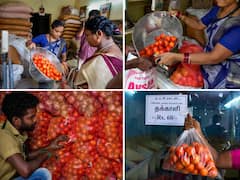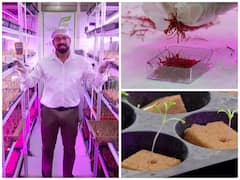Precision Farming In India: Benefits, Future And How Farmers Can Adopt This Modern Method
Precision farming appears as a promising solution to address the challenges of feeding a growing global population while reducing the environmental impact of agriculture.

By Harshvardhan Bhagchandka
India is a global agricultural powerhouse, where farming is a primary source of livelihood for more than 55% of the population, according to the India Brand Equity Foundation (IBEF). In fact, the agriculture sector in India holds the record for the second-largest agricultural land in the world, building the economy and generating employment for about half of the country’s population. Despite this, however, the agriculture sector in India is troubled by various obstacles such as low productivity, competitiveness, high biotic losses, and so on. These obstacles have hindered the sector's growth and led to a decrease in agricultural exports. Additionally, climate change and unpredictable weather patterns further exacerbate the issue faced by Indian farmers, impacting crop yields and overall productivity. Thus, to address these challenges and stay prepared to upscale its food production, precision agriculture emerged as a promising solution in India.
Precision Farming: A promising solution
Precision farming, also called precision agriculture, is a modern farming method that leverages technology to optimise crop yields, reduce waste, and minimise environmental impact. It involves gathering and analysing data from various sources, such as weather patterns, soil samples, and crop growth rates, to make informed decisions about crop management. By doing so, farmers can apply biofertilisers so that they reduce application of chemical fertiliser and use biopesticides at the right time to reduce application of synthetic pesticides. Precision farming also helps farmers identify areas of their fields that require further attention or specialised treatments, resulting in right treatment at the right place leading to increased yields and reduced expenses.
Furthermore, precision farming employs cutting-edge technologies such as global positioning systems (GPS), drones, sensors, and machine learning algorithms. These tools enable farmers to collect and analyze data in real-time, allowing them to make better decisions regarding crop management. Consequently, precision farming is becoming increasingly popular among farmers looking to maximise yields, reduce waste, and minimise their impact on the environment. Thus, it is safe to say that precision farming appeared as a promising solution to address the challenges of feeding a growing global population while reducing the environmental impact of agriculture.
How Farmers Can Get Started With Precision Farming
For farmers looking to embrace precision farming, the journey begins with understanding the available technologies and how they can be applied to their specific farming operations. So, let's delve into some steps to get started:
Assess the need: To get started with precision farming, farmers must first examine their needs and goals. This includes assessing their existing agricultural practices, finding areas for improvement, and determining how precision farming technologies might assist them in overcoming these obstacles. Farmers should also examine their budget, resources, and the level of assistance required to successfully implement precision farming.
Invest in technology: Once farmers have assessed their needs and goals, the next step is to invest in the appropriate precision farming technology. This could include purchasing GPS systems, drones, or soil sensors, as well as software and data management tools. Thus, farmers must conduct thorough research and select technology that meets their needs and delivers the best return on investment. In addition, they should also consider ease of use, compatibility with existing equipment, and future scalability. Such investments can be made as a community as well, so farmers FPO or SHGs can invest and groups of farmers can reap its benefits.
Collect, analyse, and interpret data: After investing in technology, farmers will get good insights with the help of data. For this, tools are integrated that evaluate, and understand the data produced by precision farming. The collected data contains information on soil moisture levels, crop health, weather patterns, and so forth. By examining this data, farmers can get vital insights into their operations and make informed decisions to improve their farming techniques.
Furthermore, farmers need to have the necessary skills and knowledge to effectively interpret this data or seek assistance from experts in the field.
Implement precision practices: Based on the insights gained from data analysis, farmers can implement precision practices such as variable-rate application of biofertilisers and biopesticides, automated irrigation systems, and targeted pest management strategies. These approaches can help improve resource utilisation, reduce environmental impact, and increase crop yields.
Future Of Precision Farming
Undeniably, precision farming represents a paradigm shift in agriculture, providing farmers with the skills and technologies they need to make accurate decisions, improve productivity, reduce environmental impact, and assure the sustainability of food production systems. Thus, by embracing precision farming practices, farmers can not only improve their own livelihoods but also contribute to the broader goal of building a more sustainable and resilient food system for future generations. Furthermore, with technological advancements and rising worldwide demand for sustainable food production, the future of precision farming seems bright. To highlight this fact, TechSci Research predicts that India's precision farming market is expected to reach $99 million by 2025, expanding at a CAGR of 10%.
The author is the President of IPL Biologicals Ltd, a biological solutions company in agriculture.
[Disclaimer: The opinions, beliefs, and views expressed by the various authors and forum participants on this website are personal and do not reflect the opinions, beliefs, and views of ABP News Network Pvt Ltd.]




































